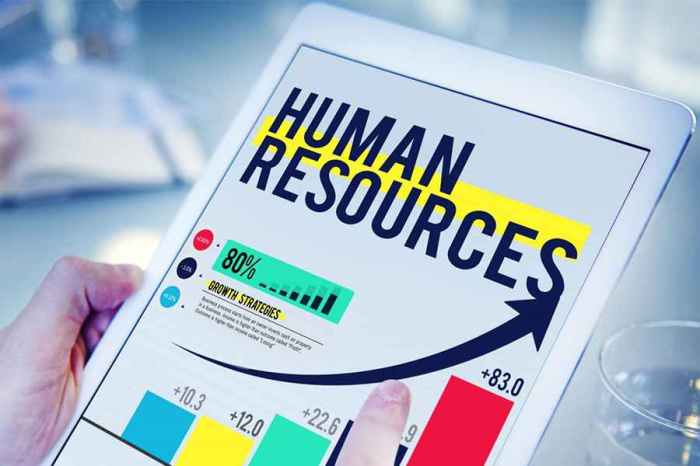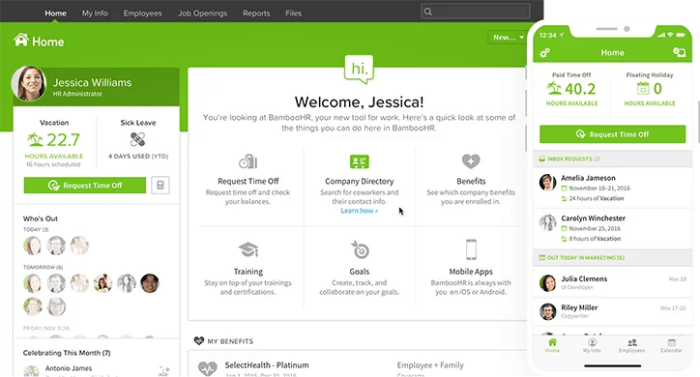In the dynamic landscape of today’s business world, small businesses face unique challenges in managing their human resources. HR management software emerges as a game-changer, empowering small businesses to streamline their HR processes, enhance efficiency, and unlock growth potential. By automating routine tasks and providing valuable insights, HR software empowers small businesses to navigate the complexities of HR management with confidence and precision.
This comprehensive guide delves into the intricacies of HR management software for small businesses, providing a roadmap for choosing the right solution, maximizing its benefits, and staying ahead in the competitive market. Discover how HR software can transform your HR operations, enabling you to focus on what truly matters: driving business success.
Introduction to HR Management Software for Small Businesses
HR management software can streamline and simplify HR processes for small businesses, saving time and resources. It can automate tasks, improve efficiency, and provide valuable insights into workforce data.
Common HR tasks that can be automated with software include:
- Payroll processing
- Benefits administration
- Time and attendance tracking
- Employee onboarding and offboarding
- Performance management
When choosing HR software, consider the following factors:
- Business size and needs: Choose software that meets the specific needs of your small business.
- Integration with other systems: Ensure the software integrates with your existing systems, such as payroll and accounting software.
- User-friendliness: The software should be easy to use for both HR professionals and employees.
- Cost: Determine the cost of the software and ensure it fits within your budget.
- Support: Choose software that offers reliable support and updates.
Features to Consider When Choosing HR Software

When selecting HR software for your small business, it’s crucial to consider essential features that align with your specific needs.
Payroll Processing
- Look for software that automates payroll calculations, deductions, and tax filings.
- Consider options with flexible pay schedules and support for multiple pay rates.
Time Tracking
- Choose software that allows employees to track their hours accurately and efficiently.
- Consider features such as mobile time tracking, GPS tracking, and overtime calculation.
Employee Management
- Select software that centralises employee data, including personal information, job history, and performance reviews.
- Look for features that support employee self-service, such as access to pay stubs and benefits information.
Types of HR Software
- Cloud-based: Accessed over the internet, offers flexibility and remote access.
- On-premise: Installed on your own servers, provides more control and security.
- Mobile-friendly: Designed for use on smartphones and tablets, allowing employees to access HR functions on the go.
Industry-Specific Features
Consider industry-specific features that may be relevant to your business, such as:
- Healthcare: Compliance with HIPAA regulations, patient scheduling, and medical benefits management.
- Retail: Shift scheduling, inventory management, and commission tracking.
- Manufacturing: Time and attendance tracking, safety management, and production reporting.
Benefits of Using HR Management Software
HR management software can streamline HR processes, making them more efficient and productive. It can automate tasks such as payroll, benefits administration, and employee onboarding, freeing up HR staff to focus on more strategic initiatives. HR software can also help businesses track and manage employee data, such as performance reviews, training records, and time off requests, which can improve decision-making and compliance.
Cost Savings
HR software can help businesses save money by reducing the time and cost of HR administration. For example, a study by the American Payroll Association found that businesses that use HR software can save an average of $4,000 per year on payroll processing costs.
HR software can also help businesses save money on benefits administration costs, such as the cost of premiums and paperwork.
Time Savings
HR software can help businesses save time by automating tasks and reducing the need for manual data entry. For example, a study by the Society for Human Resource Management found that businesses that use HR software can save an average of 10 hours per week on HR administration tasks.
HR software can also help businesses save time by providing employees with self-service access to their HR information, such as pay stubs and benefits information.
Case Studies
Many small businesses have benefited from using HR management software. For example, the company ABC Widgets saw a 20% increase in productivity after implementing HR software. The company XYZ Corp. saw a 15% decrease in HR costs after implementing HR software.
The company 123 Main Street saw a 10% increase in employee satisfaction after implementing HR software.
Implementation and Integration of HR Software

Implementing HR software in a small business involves several crucial steps:
Firstly, you must determine your business’s specific HR needs and goals. This will guide your software selection and implementation process. Once the software is chosen, it’s essential to plan the implementation carefully to ensure a smooth transition.
Effective HR software integration with other business systems, such as payroll and accounting, is vital for streamlined operations. This integration enables seamless data flow and eliminates manual data entry, reducing errors and improving efficiency.
Ensuring a Smooth Transition
To ensure a smooth transition to HR software, consider the following tips:
- Obtain buy-in from all stakeholders, including employees, managers, and executives.
- Provide comprehensive training to users on the new software’s features and functionality.
- Establish clear policies and procedures for using the software to ensure consistency and compliance.
- Regularly monitor the software’s performance and make adjustments as needed to optimize its effectiveness.
Best Practices for Using HR Management Software
To optimize the use of HR software in small businesses, establish clear policies and procedures for employee onboarding, performance management, and payroll processing. Configure the software to align with these policies, ensuring data accuracy and consistency.
Set Up and Configuration
* Define user roles and permissions to ensure appropriate access to HR data.
- Customize dashboards and reports to provide relevant insights to managers and HR professionals.
- Integrate with other business systems, such as payroll and timekeeping, to streamline processes.
Employee Training
* Provide comprehensive training to employees on the features and functionality of the HR software.
- Offer ongoing support and resources to assist employees with any queries or technical issues.
- Encourage employees to provide feedback and suggestions for improving the software’s usability.
Trends and Future of HR Management Software for Small Businesses

HR management software is constantly evolving to meet the changing needs of small businesses. Emerging trends, such as artificial intelligence (AI) and machine learning (ML), are transforming the way HR software is used to manage employee data, automate tasks, and improve decision-making.
As technology continues to advance, HR software will become even more sophisticated and integrated with other business systems. This will allow small businesses to streamline their HR processes, improve employee engagement, and gain a competitive advantage.
Artificial Intelligence and Machine Learning
AI and ML are two of the most important emerging trends in HR management software. These technologies can be used to automate a variety of HR tasks, such as:
- Screening and hiring candidates
- Onboarding new employees
- Managing employee performance
- Providing employee training and development
- Processing payroll and benefits
AI and ML can also be used to improve decision-making by providing insights into employee data. For example, HR software can use AI to identify trends in employee turnover, absenteeism, and performance. This information can then be used to develop targeted interventions to improve employee engagement and retention.
Integration with Other Business Systems
HR management software is becoming increasingly integrated with other business systems, such as payroll, accounting, and CRM. This integration allows small businesses to streamline their HR processes and gain a more complete view of their employees.
For example, HR software can be integrated with payroll to automatically process payroll and benefits. This can save small businesses a significant amount of time and money. HR software can also be integrated with accounting to track employee expenses and reimbursements.
This can help small businesses to stay on top of their finances and avoid costly errors.
Predictions for the Future
The future of HR management software for small businesses is bright. As technology continues to advance, HR software will become even more sophisticated and integrated with other business systems. This will allow small businesses to streamline their HR processes, improve employee engagement, and gain a competitive advantage.
Here are a few predictions for the future of HR management software for small businesses:
- AI and ML will become even more prevalent in HR software.
- HR software will become more integrated with other business systems.
- HR software will become more affordable and accessible for small businesses.
- HR software will play a more strategic role in helping small businesses to achieve their business goals.
Last Point
As the business landscape continues to evolve, HR management software for small businesses will play an increasingly pivotal role. By embracing the latest advancements and tailoring the software to meet their specific needs, small businesses can harness the power of technology to streamline their HR processes, optimize their workforce, and achieve sustainable growth.
The future of HR management software for small businesses is bright, promising to unlock even greater potential and empower small businesses to thrive in the years to come.

